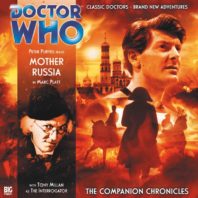
Released October 2007
Following a string of tales that sequentially explored a time within each of the Doctor’s first four incarnations during the first series of The Companion Chronicles, Big Finish begins afresh with another look at the First Doctor’s era to begin its second series with Peter Purves reprising his role as Steven Taylor in ‘Mother Russia’ by Marc Platt. Platt, of course, has already delved successfully into Earth’s history for this range with the premiere ‘Frostfire,’ and here the Doctor, Steven, and Dodo prepare for a Russian winter in 1812 as more than just the imminent French invasion rears its head.
Steven as a companion is often overshadowed by the likes of Ian before him and Jamie after him, but it’s hard to argue against the fact that some of the most immense character development and genuine drama of early Doctor Who featured this determined do-gooder. Purves always brought a certain energy and enthusiasm to his performance on screen that complemented William Hartnell perfectly, and he uncannily recaptures that same voice and energy in his first time as Steven in over forty years to add an uncanny sense of verisimilitude to proceedings. This is the first time the character has been afforded the opportunity to simply exist within a community during an adventure, and it’s refreshing to see this man who had been through so much even before meeting the Doctor casually enjoying the simple pleasures of fishing, reading, and mushrooming while also befriending the village residents and Semian in particular who teaches him how to hunt and track. Steven is wise enough to know that the peace will not last, of course, but this defining loyalty foreshadows his eventual departure from the TARDIS well by showing a man who wants to belong somewhere but is still conflicted internally and who is absolutely unafraid of standing up for what he believes to be right.
The framing device employed of a shapeshifting creature trying to exploit Steven’s memory to effectively become him is fascinating in concept but also just a bit lacking in contextual detail for it to fully reach its potential. Still, Purves’s powerful narration is superb, and he manages to deliver a startlingly nuanced interpretation of the First Doctor who begins his life here quite humbly as an amiable tutor but quickly proves once again that he can command the full attention and respect of anyone around him, including Napoleon himself who is at the helm of the French invaders. Yet while the Doctor here is very much one to simply let history occur uninterrupted as he chooses not to warn anyone of the French advance, his sudden and overt change in attitudes with rather more extreme actions as the shapeshifter takes his place do require Steven to be presented as somewhat less shrewd than usual for the plot to progress. To be fair, Steven is quite traumatised by the death of Semian, but it does narratively seems as though this creature who cannot escape its nature and becomes the top lifeform of any environment it inhabits would have been better off bypassing the Doctor and going from bear to Napoleon with more subtle changes present simply because there is no mystery once the Doctor is its target despite how effective those scenes are in providing drama and helping to set up an impactful resolution.
As with the original televised run, the character of Dodo gets little development, but she absolutely shines alongside a grieving Steven as she stands in silence and takes his hand. Still, this is as much a character study for Steven as it is a science fiction story in which the timeline potentially hangs in the balance, and the calmer moments of comfort as well as the more extreme moments in which he feels as though his friends have lost faith in him and left him behind are equally effective and definitively prove just how much Peter Purves and Steven Taylor still have to offer to the expanded development of Doctor Who in its many forms.
- Release Date: 10/2007


Leave a Reply